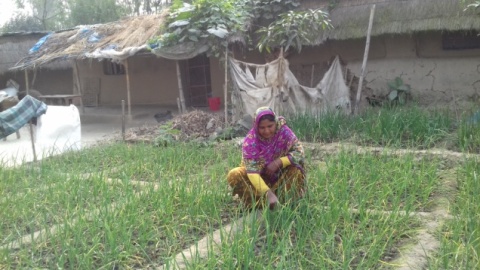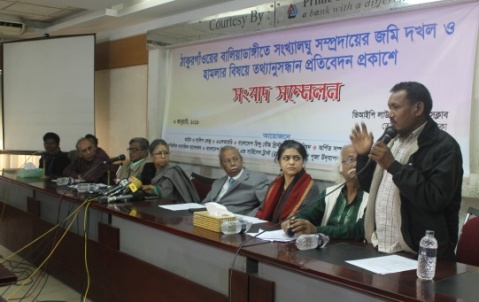Category Archives: Bangladesh
20 years of injustice
We are posting this story shared by Kapaeeng Foundation.
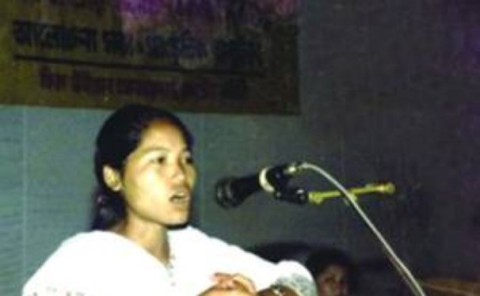
Kalpana Chakma. Photo retrieved from http://www.thedailystar.net
On 12 June 1996, then Hill Women’s Federation Organizing Secretary Kalpana Chakma was abducted and killed at her house in New Lalyaghona, Baghaichari Upzila, Rangamati District by the members of Bangladesh Army.
Up to this date, the case has not been adjudicated. Police repeatedly fails to submit report in the court.
While the Government formed an inquiry committee after three months of the incident, committee members failed to identify the perpetrators. In May 2010, police submitted a probe report with misleading contents, allegedly to cover up for the perpetrators. As the complainant – Kalpana’s brother, protested against tampered reports and documents, the case was continuously and repeatedly transferred to different investigatory departments and courts.
Even with the failure to address the case for the 30th time last 8 May 2016, there are hopes that the Investigating Officer will submit on 12 July 2016, and will finally give progress to Kalpana’s case.
ALRD conducts training on land use policy and agricultural land protection
We are posting this update shared by the Association for Land Reform and Development (ALRD).
ALRD conducted a training on “Land Use Policy and Protection of Agricultural Land” on 26-28 April 2016 to raise awareness of farmers on protecting their agricultural lands.
Twenty-six partner organization representatives participated in the training to learn concepts of land reform and its processes, and the policies on land. The discussions particularly include:
- concept of land reform and the historical evolution of land management;
- Land reform Ordinance 1972 and 1984;
- governance practice in khas land and wetland leasing policy;
- land registration;
- mutation and tax;
- Vested Property Act;
- Proposed Land Use Policy and Protection of Agricultural Land Act;
- Concept of land survey and its importance to land management;
- aggression on agricultural land;
- food security; among others.
This training has also engaged government representatives from Land Record and Survey Department of the Ministry of Land, NGO Affairs Bureau of Bangladesh, and a District Commissioner as resource persons.
This event was supported by the International Land Coalition (ILC).
Women’s groups start household gardening in Northern Bangladesh
Following her participation to ALRD’s training on Mobilization and Leadership Training on People’s Cooperative on 2-3 November 2015, Shapla group leader Jahanare Begum initiated homestead gardening in their village of Mohalbari, Chirirbandar Upazila in Dinajpur District.
Homestead gardening is promoted to women’s groups for them to practice collective farming by utilizing the pieces of land they own. While providing nutrition to their families, this initiative would also send a strong message about their rights to land ownership, access to market, and women-led cooperatives which can improve the livelihood of the rural poor.
ALRD visited Dinajpur on 9-11 January 2016 to monitor the activities of the group members and mobilize them through participatory approach on the future plan of activities for the project supported by PROCASUR entitled, “Strengthening Women’s Empowerment and Livelihood through Access to Land and Market.”
Four women groups – Suravi in Surail village, Swarasoti and Shapla in Mohalbari village, and Jagoron women group in Damoir village are practicing the People’s Initiative or “Gonoprochesta” model through organizing courtyard meeting in a regular basis. Every group has a leader who is responsible to organize a weekly meeting, collect handful of rice as savings, and put it for sale to create their own capital collectively. “It was out of our imagination to save cash money like such amount by using handful of rice,” they shared.
Most of the group members are now practicing organic vegetable gardening in their lots and plan to market these with support of SUSTAIN.
Source: https://www.facebook.com/notes/procasur-asia-pacific/women-groups-start-household-gardening-in-northern-bangladesh/1112531288771668
Rights activists demand judicial probe on land grabbing in Thakurgaon District
In a press conference organized by ALRD on 8 January 2016 in Dhaka, Ain o Salish Kendra (ASK) presented the results of an investigation conducted in October 2015 on the allegations of land grabbing by the lawmakers in Thakurgaon District.
General Secretary of the Vested Property Act Protection Movement Advocate Subrata Chowdhury said that the local ruling MP has already grabbed a portion of land of minorities in Thakurgaon’s Baliadangi upazila along the Indian border. He added that the Thakurgaon-2 MP and his family have set up a 106-acre tea garden, ‘Ranbag Islami Tea Estate Company,’ in the border of the upazila where the 35-acre lands of some 10 Hindu families are located.
Despite the local MP’s denial of the accusations, rights advocates demanded a judicial probe to the allegation. They urged the authorities to take actions against the people involved in the land grabbing and violence.
News links:
http://newagebd.net/191733/judicial-probe-sought-into-land-grabbing-by-thakurgaon-mp/http://www.thedailystar.net/city/thakurgaon-mp-slammed-land-grabbing-attempt-199243
Training on Gender Equity and Women’s Access to Land
We are posting this update shared by the Association for Land Reform and Development (ALRD).
ALRD conducted a training on “Gender Equality and Women’s Access to Land” on 16-21 January 2016 in Dhaka with 25 participants from 13 different partner organizations (11 were women). The five-day-training course was to raise awareness to the partner organizations and their beneficiaries on equal rights of women on land and other natural resources, and on elimination of all forms of discrimination and violence against women.
Ensuring women’s equal rights to land are hindered by gender-blind development policies of the government resulting to land-related violence among women. This training helped the participants to identify the loopholes of the existing legal instruments and practices of multi-dimensional discriminations and violence against women in the society. Although the Constitution of Bangladesh recognizes equal rights for women, several laws-policies and socio-cultural context of the country ignores women’s equal rights in all aspects of life. Through the discussions in the training, participants realized the need to further develop existing laws as well as social patriarchal mind-set to prevent discriminatory practices against women.
Participants committed to disseminate the lessons learned to the beneficiaries and stakeholders in their respective working areas. They will also undertake mobilization activities for creating movements in the local level.
Capacity building program on ‘Land Reform and Land Survey’
We are posting this news story shared by the Association for Land Reform and Development (ALRD).
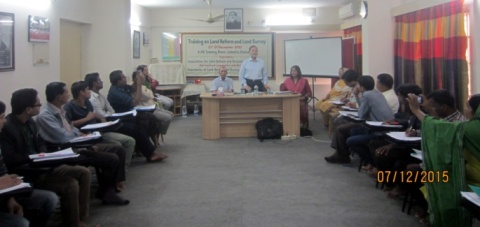
Land Record Director and Directorate of Land Record and Survey gracing the inaugural session of the land survey training.
Bangladesh is a densely populated country which results fierce competition over land. About 80% of pending cases in the country’s court of law are related to litigation over land ownership. The land ownership is highly skewed with the 80% of the rural poor having access to only 20% of the country’s land due of corruption and lack of good governance in land administration. Women, poor, and the indigenous peoples and other marginalized communities are mostly affected.
In line with this, ALRD has been conducted training on land reform and survey for 23 years with support from Land Record and Survey Department aimed at raising awareness on land management system and land survey for a comprehensive land and agrarian reform in Bangladesh.
ALRD and the Directorate of Land Record and Survey conducted a 15-day training course on ‘Land Reform and Land Survey’ on 7 to 21 December 2015 at ALRD training center. Twenty-five representatives (3 were female) from former enclave Dashiarchhara and IP leaders from Headman Association in Rangamati and Bandarban participated in the training to build their knowledge and capacity on land survey which will be helpful in land conflicts.
A field activity was also included in the curriculum.
People’s initiative groups for family farmers and agricultural entrepreneurs in Bangladesh
We are posting this news story shared by the Association for Land Reform and Development (ALRD).
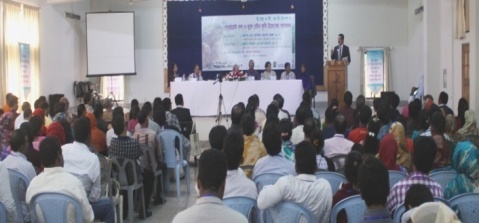
State Minister Moshiur Rahman Ranga addressing his speech on how the existing cooperatives are working and the facilities government provided to the registered cooperatives.
Since 2012, ALRD has been providing capacity building to its partner NGOs working in 12 districts to motivate and organize farmers, landless, poor, men, women, indigenous people, and youth to form Gonoprochesta (People’s Initiative) Group. These people’s initiative groups promote collective farming and joint initiatives by using their own knowledge, technology, resources, and experiences for market access. Through the process of Gonoprochesta, rural people are using their own resources to create capital for collective investment in organic agricultural production. To assess this intervention, ALRD, with Economics Professor of Dhaka University, Dr. Abul Barkat, conducted a study in July 2015 to determine its impact on land fragmentation, women engagement, and food security. This study also intends to combat land commercialization and land grabbing.
On 5 December 2015, ALRD shared the preliminary research findings of the study, “Collective farming and initiative for market access of grassroots marginalized communities’ Gonoprochesta Group: An Exploratory Study,” to the policymakers, legislators, and civil societies in a conference on Gonoprochesta (People’s Initiative- PI) Groups and Small Collective Agricultural Entrepreneurs in Dhaka.
The research team presented the potential of the Gonoprochesta group in collective entrepreneurships and in helping poor cooperative farmers become self-reliant, thus will be able to provide safe food for the people. The findings from focused group discussions (FGDs) showed that Gonoprochesta group have resulted to farmers’ engagement in collective activities (self-employment of household members), women employment, youth engagement, income earning opportunities, access to land, and improved food security.
Gathering 200 participants from civil society, NGOs, journalists, governments, and academics, the conference aimed to create an environment for cooperation of government institutions; inform the government on collective farming through the exchange of experiences; promote the initiative in helping to create a social movement; change the socio-economic status of rural people particularly in rural women for their social dignity and economic empowerment; and protect the legal environment of these initiatives.
The conference has also created a national platform to gather grassroots community people where they have shared their three years experiences on practicing Gonoprochesta activities, challenges, best practices and future dreams.
The conference was chaired by the executive director of ALRD, Mr. Shamsul Huda. State Minister for Cooperatives Mr. Moshiur Rahman Ranga graced the first session as the Chief Guest and Mr. Fazle Hossa in Badsha MP, member of the Standing Committee on Ministry of Local Government, Rural Development and Co-operatives, as special guest. Dr. Abul Barkat presented the preliminary research findings of the study. Panel discussants were Professor Shafiq-uz-Zaman and Professor Rowshan Ara from Dhaka University.
In the second session of the conference, Professor Dr. Shima Zaman of the Department of Law, Dhaka University presented another paper titled, “A Legal Study on the Stunted Growth of Cooperative Societies Movement in Bangladesh and Legal Reforms for Engendering Changes.” Dr. Zaman illustrated the flaws in the existing cooperative laws of the country. Those are rather hindering the growth of cooperatives than encouraging initiatives.
Mr. Shamsul Huda expressed his optimism about the success of the initiatives. He put emphasis on the amendment of the existing cooperatives laws of the country to create conducive environment for them to flourish.
Farmers in Bangladesh receives legal assistance from Government’s abuse
We are posting this news shared by the Association for Land Reform and Development (ALRD).

The victims sharing the falsehood by the forest department intended to grab their lands to the fact finding team. Photo: ALRD
ALRD and Ain o Salish Kendra (ASK) conducted a fact finding visit to Domar Upazila of Nilphamari District under the Rangpur Division on 11-13 November 2015 following claims on land acquisitions and abuses to Domar inhabitants by the Forest Department.
A team of two staff lawyers from ASK and a staff from ALRD visited the lands controlled by the Forest Department under the Private Forest Ordinance of 1969. These lands were acquired for forestation project where profits will be shared equally between the owners and the Forest Department.
The team has found out that the owners have never received their share for the last five decades. Moreover, in a recent land survey, the lands are said to be owned by the Forest Department. The land owners have been being deprived of the right to property and also many of them have fallen victim to false allegation and criminal cases.
Training course on women’s land rights
We are posting this news shared by the Association for Land Reform and Development (ALRD).
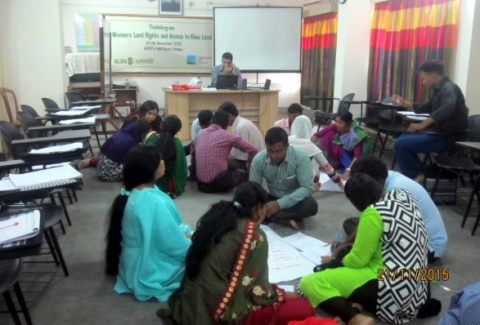
Group exercises of the participants on the rights of the women in property according to inheritance law. Photo: ALRD
On 21-26 November 2015, ALRD organized a training course on Women Land Rights and Access to Khas Land under the National Engagement Strategy (NES) supported by the International Land Coalition (ILC) in Dhaka. Twenty two representatives from 12 different partner organizations participated in the training.
The training course was to educate partner organizations and their beneficiaries on women’s right to land and other resources. Participants committed to disseminate the lessons learned to the beneficiaries and stakeholders in their respective working areas. They will also undertake advocacy creating pressure on the government and policy makers for proper implementation of international instruments and conventions ratified by the State regarding women rights including the safeguards stated in the Bangladesh Constitution.
ALRD directs financial award to community projects
We are posting this news shared by the Association for Land Reform and Development (ALRD).

All participants divided into four groups and worked out on collective way of farming by using their little piece of land. Photo: ALRD
Following ALRD’s participation in a learning route and innovation plan contest on improving women’s livelihood and access to land in 2014, ALRD, together with SUSTAIN, is channeling the financial resources awarded by Procasur to the community through implementation of the innovation project, “Strengthening Women’s Empowerment and Livelihood through Access to Land and Market.”
On 2-3 November, ALRD and SUSTAIN conducted the Mobilization and Leadership Training on People’s Cooperative in Dinajpur District. Gathering more than 50 participants who are mostly landless women, the 2-day event was to promote women-led cooperatives improving livelihoods of the rural poor.
Participants agreed to a new vision on entering into the People’s Initiative process (or ‘Gonoprochesta’ model) and taking into account social and economic changes. This initiative “promotes sustainable, small scale, family-based organic farming and rural enterprises, and provides direct access to land and market for disadvantaged communities, which in turn contribute to the country’s food security. The Gonoprochesta model empowers women by advocating their recognition at policy making level, and by enabling access to public land and to supporting services such as bank credits, agricultural inputs and technology, information and knowledge, and policy dialogue with government institutions. During the process, women are encouraged to create their own capital collectively, and to invest it in agricultural production of food and organic fertilizers.”
Participants selected their leaders and set a work plan for the next three months which includes saving a handful of rice twice a day and organizing weekly meetings. Their activities will be monitored and guided by the local partner organization of ALRD.

